- Home
- Tim Winton
In the Winter Dark
In the Winter Dark Read online
For Denise and Jesse
and for the Nannup Tiger
wherever you are
There is such a thing as the pressure of darkness.
Victor Hugo
IT’S DARK already and I’m out here again, talking, telling the story to the quiet night. Maurice Stubbs listening to his own voice, like every other night this past year, with the verandah sinking and the house alive with solitary noises the way it always is when the sun’s set on another day and no one’s come to ask the questions they’re gonna ask sooner or later. I just sit here and tell the story as though I can’t help it. There’s always something in the day that reminds me, that sets me off all hot and guilty and scared and rambling and wistful, like I am now.
This morning I found Jaccob down at his boundary fence drunk as a mongrel again, and I carried him up the hill to his place and lit him a fire, fixed some food, cleared away the bottles and that shoe he leaves around, and I left him there in that big old house before it drew breath and screamed my name. An old man like me can lift him now, for God’s sake. He’s always drunk or silent and skyward as a monk. There’s only me and him left, but he doesn’t speak.
So I’m the teller. But why don’t I keep my mouth shut? Why? Because someone has to hear sooner or later. Because the bloody dreams don’t go away. Because today I saw a real estate agent sniffing around across the valley at the girl’s place. Because I’m alone, I’m alone here on the farm, the carrier of everyone’s memories. So when the dusk comes, in that gloaming time of confusion when you can’t tell a tree-stump from a kangaroo, an owl-hoot from a question in the night, the dark begins to open up like the ear of God and I babble it all out, try to get it straight in my mind, and listen now and then for a sigh, a whisper, some hint of absolution and comfort on the way.
This is what I remember, but it’s not only my story. It happened to Ida, too, and Jaccob and the girl Ronnie. It’s strange how other people’s memories become your own. You recall things they’ve told you. You go over things until you think you can see the joins, the cells of it all. And there’s dreams. I have these dreams. Dead people, broken people bleed things into you, like there’s some pressure point because they can’t get it out anymore, can’t get it told. It’s as though the things which need telling seep across to you in your sleep. Suddenly you have dreams about things that happened to them, not to you, as if it isn’t rough enough holding down your own secrets. I don’t know how it works – I’m no witchdoctor – but I know I remember things I can’t possibly know. I’m not mad. Not yet.
They call this valley the Sink. Well, they did when I was a young man. From my verandah of an evening you can see mist on the dark sheen of the swamp and the riverbend below. Ducks spatter round the old white bridge. Frogs come on with the sound of marching. The jarrah forest takes the westering sun as a prick of blood on its brow. There’s still only three houses. On the stony pasture across the valley there’s the little house surrounded by fallen fences where no one’s lived since Ronnie, the girl. Weird thing is, I got to like her in the end, but everyone likes the helpless and the vanquished. To the left, on the slope just up from here, Jaccob lives in the limestone place that’s been there nearly as long as I remember. We used to call it the Minchinbury place. God, how I hate that house. Jaccob’s chimney smoke rising like a spirit against the gloom. He’ll be sober enough to start drinking again by now. Since the day we dug a grave and drove to the hospital, the day we sat together like friends and drank half a case of Japanese scotch and talked and talked it all out, we haven’t said a word to one another. It’s a year.
MY NEIGHBOUR Murray Jaccob used to push a lawn-mower for a living. Just before it sent him deaf, he retired to nurse his crusty little crop of skin cancers. He sold up the business, left the city and came here. Jaccob wanted to devote his retirement to the growing of grass. He was a big man in his late forties with streaky bleached hair, a kind of worn-out stooped look about him, and a way of looking at you as though he could never be quite certain where you fitted in; it might have been the way he squinted, or maybe the habit he had of speaking to a point just to the left or right of you. But I could understand that after twenty-five years of cutting lawns, a man’d want to grow long, scruffy, weedy grass, the sort you could wade through and see lapping in the wind. He never wanted to see lawn again as long as he lived. He bought the old Minchinbury place amidst run-down orchards, some good pasture, and a lot of uncleared thickets and forest. When I was a boy, a Doctor Minchinbury made it his country residence. When he died, he left his daughter there to grow old and crazy. I remember her too well. The house had to be rebuilt since her day – the wooden bits, anyway, but it’s still the same grand, fatuous-looking joint dominating the hill with its wide timber verandah and whitewashed stone. There’s nowhere you can be in the Sink where you’ll miss seeing it.
Jaccob was no farmer. I noticed how late he got up. He had a policy of doing nothing. He was rigorous about it. From his place the riverbend was obscured by a hump in the lower slopes of his land, but as he walked daily between rows of scourged fruit trees he could see the black sprays of birds rising from it to curve out over the swamp. It was a kind of ritual, that walk in the morning. The rest of the day he’d involve himself in trivial tinkerings that chewed up the time and left him at dusk, looking down through the broken ranks of orchards with the satisfaction of knowing that he hadn’t done a damn thing all day, hadn’t begun to put the place to order, hadn’t learnt any more about orchards, and above all, hadn’t had his ears thrashed by a machine and his nose stung with two-stroke fumes while his brain broiled in the sun. One more lawn-free day.
Jaccob was the first to notice something. I know it so well now, it’s like I’m there myself.
Walking in the orchard late in the day, Jaccob saw the flash of a windscreen across the valley. The few months he’d been here, he’d kept clear of his neighbours. Ida and me seemed friendly enough in a stiff sort of way. We were the old couple who’d been around forever. Jaccob felt the amusement of those yokels, the way they saw his presence, his kind of life. But he couldn’t know what hatred there was in me, what fear.
His other neighbours, across the valley, were a young pair. He wouldn’t have called them hippies; they were kind of modern types from the city. He’d spoken to them a couple of times. The girl was pretty enough, though she wore clownish clothes and had her hair in spikes. The boy wore overalls, but you could tell he belonged in a leather jacket. Jaccob didn’t know a thing about them and he was not curious, though that afternoon as the sun caught the windscreen of his neighbours’ car over the valley, he watched it wind down to the road. He heard the unreasonable note of the engine and the muffler grinding as the stationwagon left the gravel and pulled away towards town. He caught himself staring after it and it made him laugh. An event! Good gawd, he thought; what a life to have found.
He turned to go back up to the house. The light was failing and he had wood to chop. He set off, but something stopped him still as a stump. Between the trees he saw something. A movement. A silhouette. It was travelling. Loping, that was the word that came to him. He squinted. All around him, birds were roosting, or stirring, or something. He heard the tick of his own body. The shadow seemed to stop, slip sideways between apple rows. And then there was nothing.
It was the evenings that took getting used to. Jaccob was teaching himself to do very little and to be content. In the city he’d spent evenings by the TV with a beer and a buzz in his ears. As he’d got older, it took more beer, more repeats of High Chaparral to soften his nerves. His bones ached, his sunburn stung, blood chugged in his ears. And the last couple of years there was that other twinge too, but only dreamless sleep could rid him of that.
Here at night, Jacc
ob was becoming a reader. To his new life he’d brought his carved jarrah rocker, some old Marty Robbins records, and a pile of big novels by people he’d never heard of. With its great awkward stylus like a plough, his ancient hi-fi was probably, he thought, the only agricultural implement he was ever likely to use.
That night he made a fire, put old Marty’s ‘El Paso’ on repeat, and sat rocking with Look Homeward, Angel over his knee like a fat little lapdog. He was good at not letting shadows and suspicions ruin everything. He was new to the country; there was no point worrying. He poured some whisky. Before long he slept.
There was a dream he had, an old one flashing the colour of lightning in him. A yowl of grief, the panic rising in his chest like locusts on the wing as, in another life again, he threw the newspaper aside and began to run for the nursery door. Now Marjorie was screaming, shaking the cot as he came. I know this dream. It’s Jaccob’s, but I have it too, these days.
Jaccob slept on.
As that stationwagon wound down the gravel drive in the sunset, someone else had been watching too. She saw her great herd of muscovies scatter from its path. She saw the KEEP MUSIC LIVE sticker on the rear window – she’d stuck it on herself. The car left in the only direction it could – away. There were no passers-by here, no through traffic. These farms form a cul-de-sac at the end of a back road. The car disappeared around the first bend and was gone. The young woman found herself standing alone out in the cold, hugging herself until her breasts hurt. Her name was Veronica Melwater, though the man who’d just left her called her Ronnie.
She shivered. The kind of shiver you have when you cut yourself, in that moment before the blood springs, when there is only the shock of the open wound and the anticipation of pain or maybe outrage.
She’d helped him load guitars and amplifiers into the car, listening to him say how it was only a couple of weeks. We need the cash. You don’t wanna go back to the suburbs, do you? Jesus, it’s not like the old days, you know. Be reasonable, Ronnie.
Her muscovies scuffled behind the troughs for night shelter, and she could hear the geese somewhere coming up from the river. There was the goat to milk and night was ready with the sun setting the trees afire up behind the old people’s place over the way, but she stayed there until it flared briefly and went out altogether. She looked up to the great white house on the hill, the Minchinbury place. Now, that was a place, alright. Mist formed on the valley slopes below it. Looks like a movie set, she thought. But her eyes wandered and her mind came back to the huge empty space she seemed to be walking in. Who the hell needed to empty their wardrobe for a two week trip? She knew what that meant. She wasn’t stupid. Well, not in that way, boy. She knew things weren’t like they were in the old days. Didn’t she, though.
It was dark when she went inside. The little house had been an old soldier settlement place they’d repaired and filled with potted plants and posters. There were a few lumpy, handwoven rugs, a spinning wheel she’d never really learnt to use, a potbelly stove, some simple furniture. The walls were scabby with stripped wallpaper. They’d never got around to finishing it off and putting some bright paint on the walls.
‘Ah, Ronnie,’ she told herself aloud in that dark, small place, ‘don’t panic. It’s alright. It’s just two weeks.’
She rested her low, full belly against the windowsill in the front room and felt the baby slip and kick inside her. All the Valium made her light enough to move without muscles, to float, like him or her, in warm fluid. She looked out into the dark and suddenly she was afraid. She had no car, for Godsakes. How would she get to town if she needed to? What was he doing to her? The money was gone, sure, but what else was going on? What about the staying out of music, what about the promises? Oh, Ronnie you are so dumb, girl.
The room was dark and the faces of dead musicians and dead actors peered down at her. She held her belly. It was sinking in and it was like the pills were great white clots in her veins. Too many, Ronnie. She didn’t even know how many she took, these days. But any of it had to be too much.
She felt this swimming creature in her, and she wanted to speak to it, to explain it all, but she was ashamed. She’d read the books, she knew what she’d been doing. Jesus, she thought; one minute you’re paying some rich bastard to cut one out of you, and the next thing you’re wanting one and you poison it.
Out in the dark she saw the anaemic cheek of a full moon rising from the forest. Stumps, windrows, clumps of gravel queued behind their own shadows.
Stuck. With everything, with everybody, she was stuck. It was quiet and she stood there feeling the strength go out of her. Always, she thought. Always when everything looks like coming together, just when you get up some guts, you get stuck. In the old days there was no problem. Then there was always a bit of acid to drop – keeping tabs on yourself, she called it. You stepped sideways and said fuck it. Ah, the old days.
It gave her an idea.
In the bedroom she knelt and pulled out a drawer beside the bed. She took it right out and put it on the floor. She reached into the hole it left and felt around the frame of the cabinet until she felt the little cellophane package taped to the wood. Old stock. A memento, really. She looked at it a while. No, things’d have to be black. She sat on the bed, getting strength back. She wanted this place, she wanted this baby and she was gonna have them both. She made a fist in the half light until she couldn’t even see the tab in front of her. And then everything crumbled and went the taste of shit in her mouth, the taste of blotting paper. Fuck it, she thought; I deserve something.
When the walls began to breathe, Ronnie got up off the bed and went outside. It looked nicer out there. She felt the cold in an academic sort of way. Mist sifted past. It was like walking in the clouds. Better than breathing walls.
The sounds of the night were sharp. Crickets sounded like weapons being cocked. Her boots hissed in the grass. The bloated moon followed over her shoulder; she didn’t like to look. The incline steepened toward a ridge of granite. The rock fairly pulsed in the blue light. Ronnie heard her own gasps, too loud to be hers.
The twisted trunks of redgums walked past, writhing. The ground was billowing now. Never do it alone, Ronnie. Oh, you never needed to in the old days.
She came to a delicious bank of grass and lay down in it. Up through the shreds of mist and the towering wet blades, the stars glowed. No, she saw, they glowered. I know, she thought; I know, you don’t have to tell me. Cold beneath her, the earth soaked up her heartbeats and the stars showed blood in the dark contusion of sky. She heard a snapping, slapping deluge of footsteps, and turning her head she saw an army of ghosts marching upon her. They shrilled and squawked and sprayed shit.
‘Oh, God! Nick? Nick!’
They closed on her with their great infernal pink bills pointing down at her from the end of looping white necks. And wings, evil white wings. There was purple fire in their eyes. She knew what they were, but they were more than that, you only had to use your eyes. She covered her belly and then they were gone. She got up and ran.
Ronnie stumbled through the granite boulders.
This wasn’t the proper world. Tiny marsupials smashed through the bush. All the colours, all the dyes came unstuck and she walked through them.
A dam, huge pore in the flesh of the earth.
A fence. She plucked a riff crawling through.
There was forest.
There was forest.
Forest.
Forest.
Half the night there was Ronnie and there was jarrah forest, and yet it was no time at all.
There were places here the moon could not follow. No time at all but fast-time, quick-time, hurry-time that she dawdled in. She came to thickets. Thickets and thickets of thickets.
A year into the night there was sudden pasture again. Fog still. She coughed. Someone’s hack. She swam through grass, played fences, began to find an incline. Big white house full of music. Trees like a graveyard. The road was a ribbon in the wind. She c
limbed aboard and surfed it, rode road bronco. It was fun enough to die. And in mid-step she fell asleep and went down into a softer dark. No, it wasn’t like the old days.
IDA AND me were married thirty-six years. We thought of ourselves as good country people; we knew what we knew, and tried to mind our business, or at least to be discreet when we minded someone else’s. That night, as Jaccob slept, as Ronnie lurched around out there, Ida and me waited for dinner to cook. It was late because I’d worked through till dark, fooling with a fuel line in the ute.
She was a cunning woman, Ida, and I liked that about her. It was cunning that got her married to me. Our families look grim in the wedding photos. Everyone, including me, thought our Ida was with child. Her people disliked me, and now they had the chance to hate me, but there was no way they could avoid a marriage. Or so they thought. Lord, didn’t we all get a surprise! There was no baby in that girl’s belly – not for a year or two.
Pork chops spat and sizzled on the stove. It was warm in our big kitchen tonight. You could tell Ida had ideas for later when she cooked pork, but after nearly forty years of falling for it every time, a man has to pretend he doesn’t know when he’s being seduced. In those days, after a hard day’s work and before a good meal, I liked to get by the stove with a volume of my Pictorial History of Australia At War and a bottle of beer and some bread and butter so I could get inside myself, all sullen with pleasure. I spread the big book on the table and listened to the urn hiss on the stove and sank into the comfort of history, the terse outlines, the facts, the bare black and white photos. I was never in a war, but my interest was deeper than that. In a way I’ve lived my life by the weather (that faithless bitch), and history, it seemed to me, was something solid, truthful, unswerving. Well, that was those days. I sat there airing my feet in their socks, and Ida tinkered with the chops in the pan.

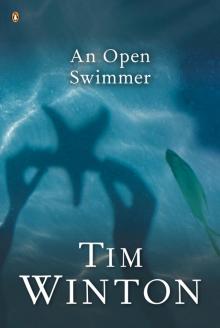 An Open Swimmer
An Open Swimmer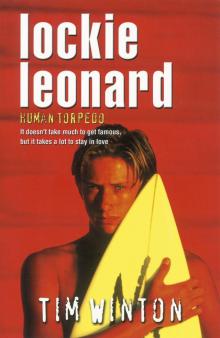 Human Torpedo
Human Torpedo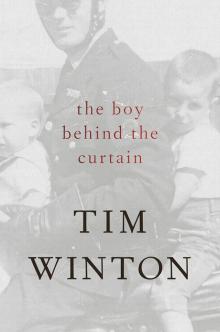 The Boy Behind the Curtain
The Boy Behind the Curtain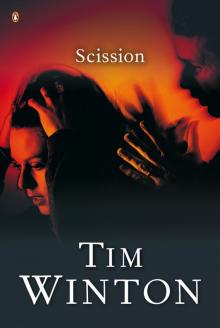 Scission
Scission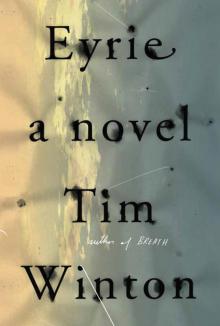 Eyrie
Eyrie Island Home
Island Home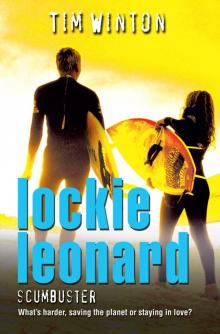 Scumbuster
Scumbuster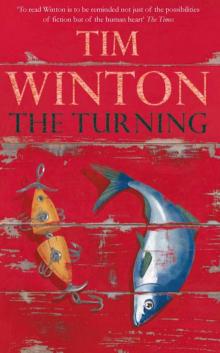 The Turning
The Turning Legend
Legend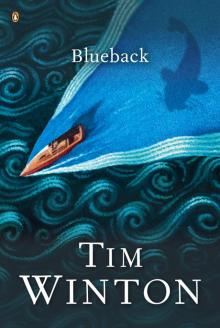 Blueback
Blueback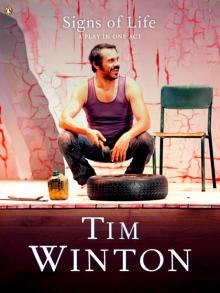 Signs of Life
Signs of Life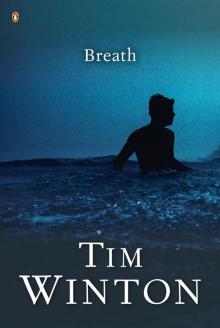 Breath
Breath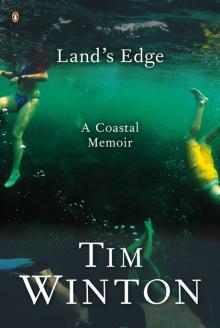 Land's Edge
Land's Edge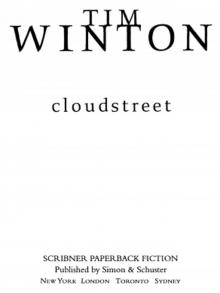 Cloudstreet
Cloudstreet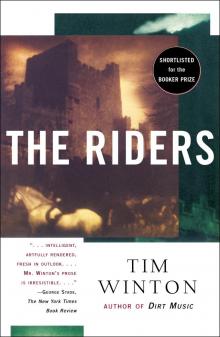 The Riders
The Riders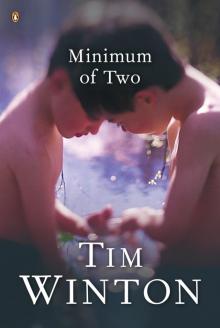 Minimum of Two
Minimum of Two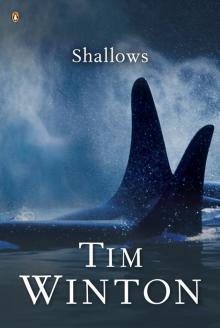 Shallows
Shallows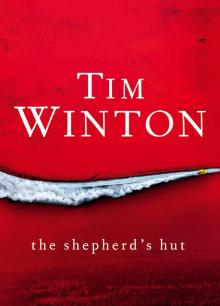 The Shepherd's Hut
The Shepherd's Hut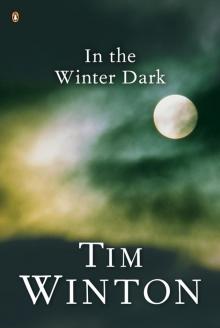 In the Winter Dark
In the Winter Dark